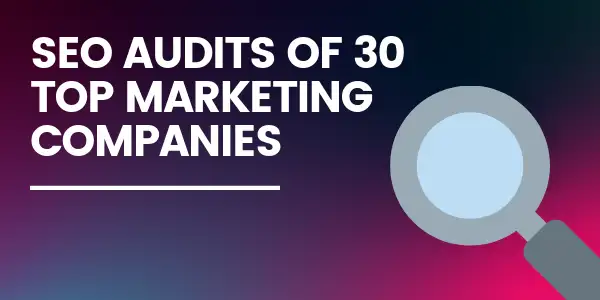
SEO Audits of 30 Top Marketing Companies
Any SEO company will say that they can get their client in top ranking positions for their keywords – but what’s stopping them from achieving the same for their own sites?
Here at Reboot, we decided to do a technical SEO audit of top digital agencies to discover how good those in the Marketing and SEO industry are at practising what they preach. That is- do they follow SEO best practices on their own sites?
Our Study Methodology
In order to pick our list of digital marketing agencies to analyse, we did a search for the highly competitive term “digital marketing agency”. We popped this into the marketing tool SEMrush and pulled the top 30 marketing companies that ranked for the term (essentially, the first 3 pages of the Google SERP). Our very own site was also included in this list, so we decided to audit ourselves too!
For each website, we assessed a large number of metrics, including:
- Page speed
- Number of pages indexed
- User experience
- Meta tags
- Keyword optimisation
- Internal linking
- Duplicate content
- Anchor text linking to the site
- Potential Google penalties
- Incorrect pages indexed on Google
- Expertise, Authoritativeness and Trust (E-A-T) – trust signals
- Backlink quality
- Domain Authority
We outline what all of these metrics mean in our other study on SEO for Accountants which you can read here.
Our Findings
The 5 most common SEO issues found were:
1. 70% of agencies had a poor page speed- the average score given was 41/100
2. 63% of agencies had a lack of internal linking
3. 57% of agencies had undesirable pages indexed by Google.
4. 52% of agencies had pages containing thin content.
5. 47% of agencies had pages poorly optimised for keywords
Page speed:
The vast majority of sites analysed had poor page speed, scoring a mere 41 from Google’s Page Speed Insights tool.
Google uses a scale of 90-100 (fast) 50-89 (average) 0-49 (slow) to measure page speed.
Since this has been confirmed as a ranking factor (and is especially important given the growth in mobile searches), it is perhaps interesting to note that the victims of the slowest average page speed among digital agencies were in fact found to be ranking on page one.
This perhaps reveals that Google has placed less importance on page speed as a ranking factor, compared to other metrics like backlinks or a sound website structure. Page speed optimisation should not be neglected, however, as it may become increasingly important, considering the weight that user experience has on rankings today.
Reboot’s own page speed scored 84 – Just missing out on a “fast” rating, but still far higher than the industry average.
Internal linking
A problem experienced by the majority of agencies audited was that of internal linking. Or lack thereof.
63% had neglected to link internally to other pages on their own site. Not only does this not help Google comprehend the structure and theme of your site, but it can also create internal competition issues if you are talking about something that is not the focus of the page but do not add an internal link to let Google know you have a more relevant page for that term.
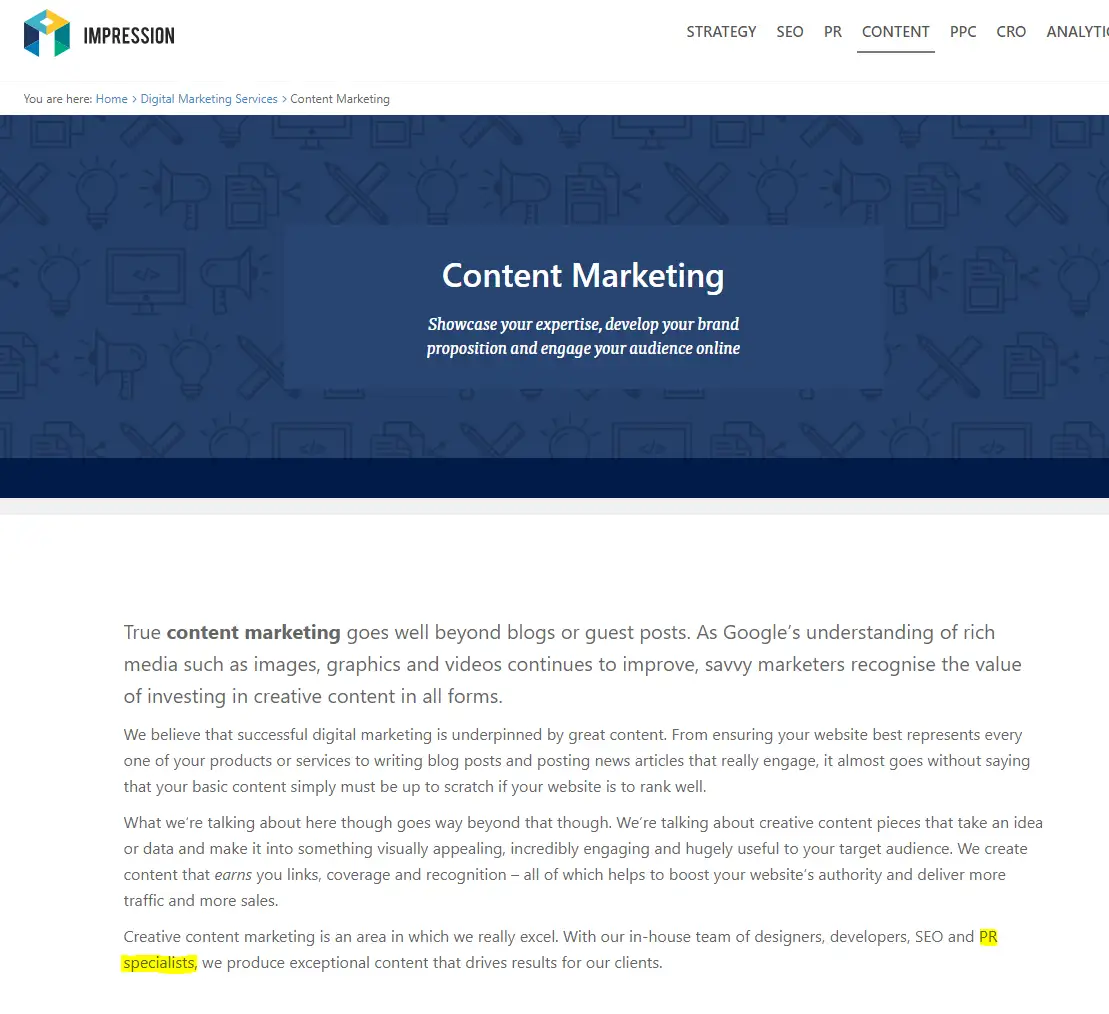
Most of the sites that do not link internally can be found on the 3rd page of rankings, however, it is still witnessed on agencies ranking in the top 10 positions. The agency Impression, for example, has the perfect opportunity on its content marketing agency page to link to its PR landing page but fails to do so.
Impression currently ranks at number 10 and could therefore benefit from a solid internal linking strategy.
Indexing
Another common issue amongst digital agencies was pages that were incorrectly indexed by Google. Our study found that around 57% of agencies had pages indexed on Google that should not have been, for example, blank pages, or automatic “thank you” pages after submitting a form.
This issue was far more prevalent for websites ranking on the second and third page of results. 70% of page 2 digital agencies displayed indexing issues, and this figure goes up to a massive 75% for page 3.
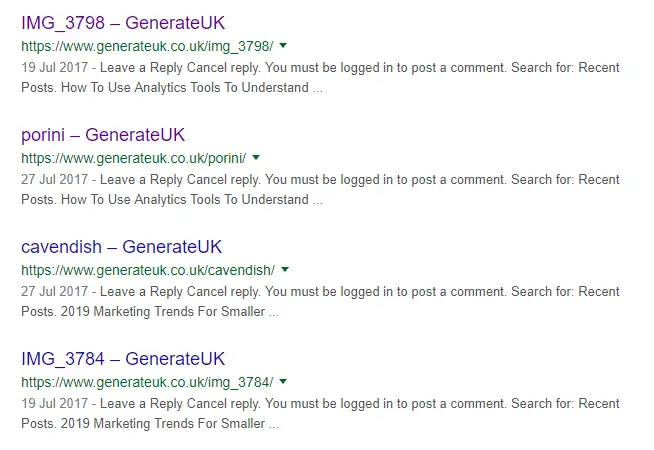
An example of poor indexing can be seen in the agency GenerateUK. Upon doing a “site:” command on Google, we found that these pages had been indexed by Google- even though each one only displayed a single image, without any content. It would therefore appear that these pages shouldn’t exist- and certainly shouldn’t be using the agency’s crawl budget to index and revisit them.
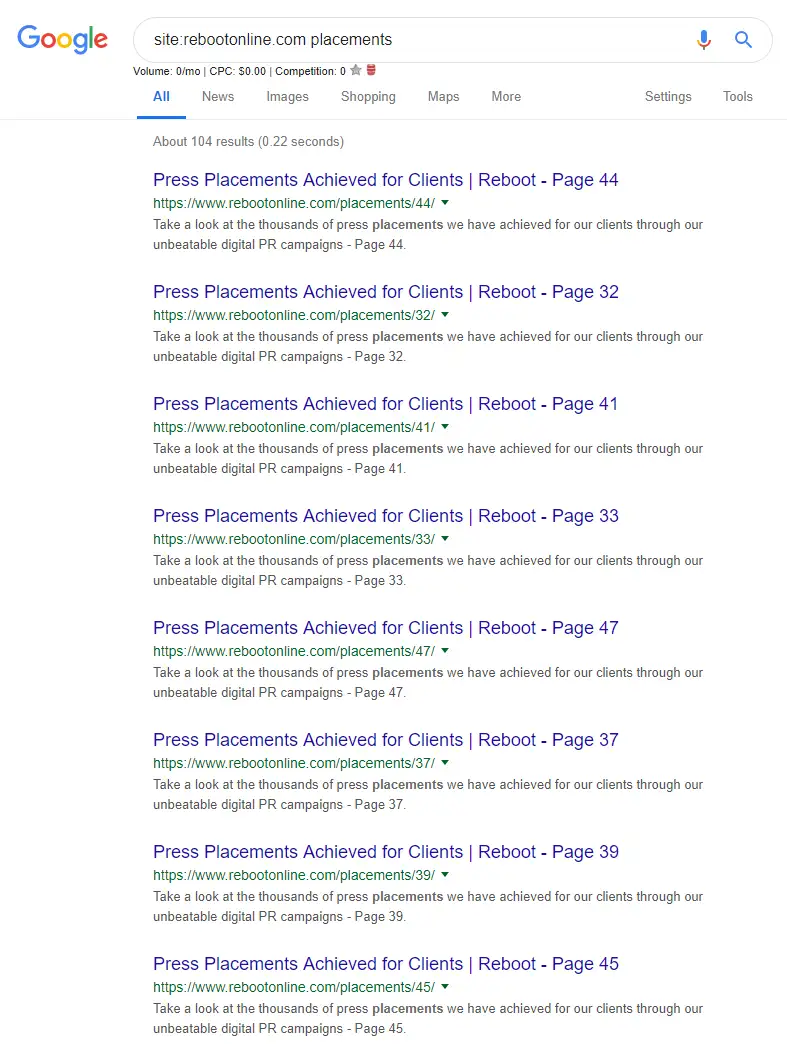 During our rigorous auditing, we also found some indexing issues on our very own site, Rebootonline.com. We discovered that pages from our press placements had been indexed by Google (we’re talking over 60 pages). Since finding this out we have included a ‘noindex’ tag on all pages apart from the first one, in order to stop them from appearing in the search results.
During our rigorous auditing, we also found some indexing issues on our very own site, Rebootonline.com. We discovered that pages from our press placements had been indexed by Google (we’re talking over 60 pages). Since finding this out we have included a ‘noindex’ tag on all pages apart from the first one, in order to stop them from appearing in the search results.
We also discovered some orphan pages for ex-members of staff that hadn’t been changed to a 404 – an issue we have since resolved.
Thin content:
Almost half of the digital marketing companies we audited (52%) had issues with thin content or content that was not relevant or useful to the searcher (such as a page with no text).
Around a third of agencies on page 3 had pages of thin content, compared to only 13% of those ranking on the first page. Showing that this is certainly a missed trick that could help smaller agencies rank higher.
We can see an example of thin content upon auditing the agency Brainlabs. A page “Life at Brainlabs” was indexed and being crawled by Google, but contained no information, or content at all, as witnessed here:
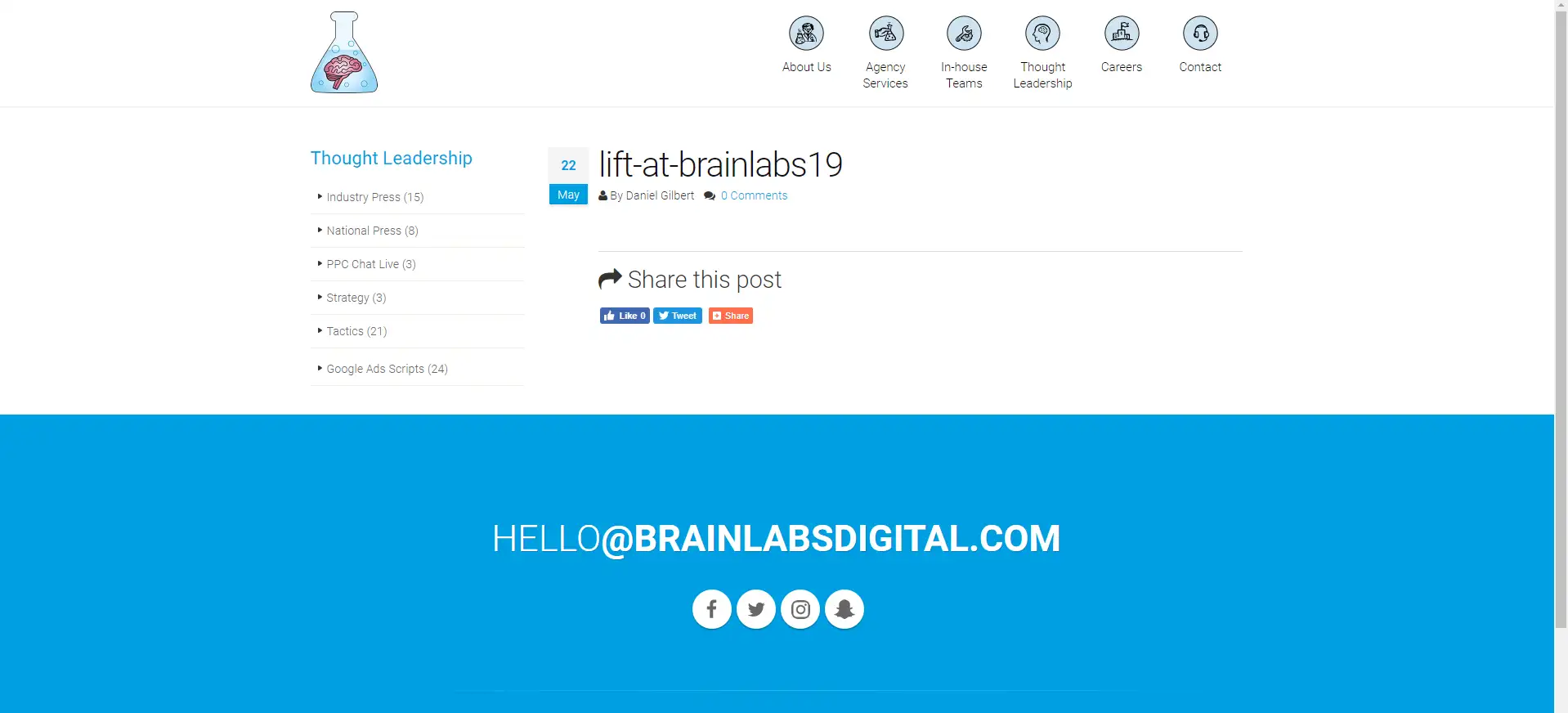
Keyword Optimisation:
We found out that a whopping 47% of SEO/marketing agencies had not fully optimised their pages for keywords.
By this, we mean that they were not making the most of their H1s, or utilising LSI keywords on their landing pages (particularly for their services).
For instance, a page on “Digital PR” should mention other words from their keyword research, such as “Digital PR services” or “PR agency”. Many marketing companies simply left their H1s at “Digital PR”- but this doesn’t fully tell Google what your page is about. Is it a guide to public relations? A service? This should be clarified using your title tags.
Other SEO issues
Although not as prevalent as the issues listed above, we also found other technical problems with some of the ranking websites, including:
Meta tags: An important thing to consider for any business, but especially one that stated to be an expert in SEO, is your meta title. This is what appears in the SERP for your result, and should entice a click. A higher click-through rate will show Google that your content is good, and relevant for the keyword, helping you to secure those rankings. Our audits revealed that 20% of digital marketing agencies had poor meta titles, especially for service landing pages.
Duplicate content: 27% of digital marketing firms were found to have copied content across the web.
Backlink quality: One third, or 33%, of the agencies we analysed had poor backlink quality. This meant either they had only directory links with little proof of quality organically earned links, or they had links from poor quality, even spam, sites. This figure drops significantly to just 12% of sites ranking on page 1.
Things that agencies were doing well
E-A-T: When it came to sending out positive trust signals to Google, the digital marketing agencies did a great job:
-
100% had an SEO and marketing blog (although 20% of agencies haven’t posted a thing since January 2019!)
-
100% had https
-
29 of the 30 agencies had a social media presence
-
100% had displayed their contact information
-
83% had an “about” or “meet the team” page
Anchor text: Unlike back in the days of rife black-hat SEO, most agencies (over 90% in fact) have normal anchor text from backlinks, revealing that they are not trying to get targeted terms linking back to specific landing pages on their sites.
Our audits have taught us a lot about how marketing agencies, including our own, need to practice what they preach when it comes to digital best practices. But, as they say, a cobbler always wears the worst shoes...!
Page Updated - What Has Changed?
We're always pushing for perfection, so we updated this blog post to remedy any typos, grammatical errors, and to update links.
Get in touch today for help with technical SEO for your business, or any other SEO marketing service.
